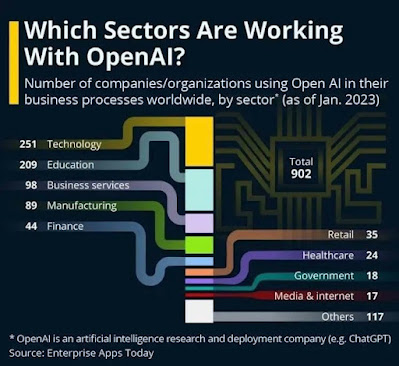Ethical Implications of Advanced Language AI Models - OpenAI - ChatGPT
Advanced language AI models, such as ChatGPT developed by OpenAI, have the potential to significantly transform the world of the internet by enhancing communication, content creation, and online services.
These models can generate human-like responses to text-based inputs, which can improve customer service chatbots, language translation tools, and even content creation for blogs or social media.
They support more personalized interactions between people and machines, allowing for more efficient communication. Additionally, advanced language models can assist in data analysis and decision-making by processing large volumes of text-based data.
“Great power comes with Great responsibility!!!”
The use of these advanced language models can have unintended and unethical impacts. This blog post explores the potential ethical issues associated with advanced language models and their implications across various domains such as the spread of misinformation or malicious content. The focus is on how these models perpetuate biases, undermine privacy and autonomy, and pose ethical dilemmas that can lead to potential harm to individuals and society as a whole.
Through this discussion, the aim is to raise awareness of these unethical impacts and encourage critical evaluation and responsible deployment of advanced language models.
There are several reasons why advanced language AI models like ChatGPT may give erroneous or unethical outputs, including biased training data, lack of context, overfitting, adversarial attacks, limited training data, and human error:
Biased Training Data: AI models are only as good as the data they are trained on. If the training data is biased or incomplete, the model will replicate and amplify those biases.
Lack of Context: Language is complex, and meaning can be heavily influenced by context. AI models may struggle to understand the nuances of language and may misinterpret or misrepresent text
Overfitting: AI models may be trained on a specific dataset, and as a result, they may become overfit to that dataset. This means that the model may perform well on that particular dataset but will not generalize well to new data.
Adversarial Attacks: Adversarial attacks are deliberate attempts to trick or mislead AI models. These attacks can take many forms, including adding noise to data, altering images, or modifying text.
Limited Training Data: AI models require large amounts of training data to learn patterns and make accurate predictions. If there is limited training data available, the model may struggle to make accurate predictions.
Human Error: Even with the best training data and algorithms, human error may occur during the design and development of the model, the collection and preparation of training data, or during the deployment of the model.
It is important to carefully consider these factors when deploying AI models. Otherwise, it can lead to unethical or erroneous or misleading outputs that perpetuate discrimination, reinforce stereotypes, or otherwise harm individuals or groups.
In the following sections, we will explore the potential unethical impacts of advanced language AI models. We will examine how these models can perpetuate biases and discrimination in the workplace, undermine privacy and autonomy in personal communication, and pose ethical dilemmas:
Impact in Employment:
One of the potential unethical impacts of Advanced language AI model like ChatGPT in employment is job displacement, where certain jobs, such as content creation, customer service, and even data analysis that were previously performed by humans may be automated by these models, leading to unemployment or the need for individuals to acquire new skills to remain relevant in the workforce. This could disproportionately affect individuals in certain industries or those with specific skill sets, leading to economic inequality, and perpetuation of biases and discrimination.
Impact in Privacy:
Advance language AI models require large amounts of data to be trained effectively, which may include personal information that individuals may not want to be shared. Additionally, these models may be used to analyze text-based data, such as social media posts or emails, which could raise concerns about surveillance and the use of personal information without consent.
The use of these models could also perpetuate stereotypes or biases found in existing systems or data sets, leading to further discrimination or inequities. It is important to ensure that data privacy regulations are followed and that individuals are made aware of how their data is being used.
Potential Misuse:
Advanced language AI models have the potential to be misused, just like any other technology. They could be used to generate fake news, spam, or other forms of malicious content. Additionally, they could be used to manipulate individuals or spread propaganda. It is important to take steps to mitigate these risks, such as implementing algorithms to detect and remove malicious content.
Impact in Software Development:
Advanced language models like ChatGPT could revolutionize software coding by enabling developers to write code in natural language instead of complex programming languages. This could make coding more accessible to a wider range of individuals and reduce the need for specialized technical skills.
However, there is also concern that this could lead to lower-quality code or creation of code that is difficult to understand or maintain, leading to potential security risks, cyber-attacks or other issues. It is important to ensure that the use of these models in coding is carefully considered and that appropriate checks and balances are put in place.
Impact in Education:
The use of advanced language models in education could perpetuate biases and discrimination by reinforcing stereotypes or assumptions about certain groups. Additionally, the use of these models in grading or evaluation systems could lead to unfair or inaccurate assessments.
Impact in Healthcare:
The use of advanced language models in healthcare could lead to perpetuation of biases and discrimination in medical diagnosis or treatment. Additionally, the use of these models in medical decision-making could lead to potential ethical dilemmas, such as how to balance the accuracy of the model with patient privacy and autonomy.
Impact in Criminal Justice:
The use of advanced language models in criminal justice could perpetuate biases and discrimination in sentencing or policing practices. Additionally, the use of these models in predictive policing or risk assessment could lead to potential ethical dilemmas, such as how to balance the accuracy of the model with individual rights and due process.
Impact in Politics:
The use of advanced language models in politics could lead to the creation and spread of fake news or malicious content. Additionally, the use of these models in political campaigning or messaging could perpetuate biases and discrimination or lead to potential ethical dilemmas, such as how to balance the accuracy of the model with the transparency and fairness of the political process.
Impact in Finance:
The use of advanced language models in finance could lead to perpetuation of biases and discrimination in financial decision-making or lending practices. Additionally, the use of these models in fraud detection or credit scoring could lead to potential ethical dilemmas, such as how to balance the accuracy of the model with individual
Advanced language AI models have brought about significant advancements in various domains due to their remarkable natural language processing abilities.
Our exploration of the potential unethical impacts of advanced language models highlighted their ability to perpetuate biases, undermine privacy and autonomy, and cause harm to individuals and society.
To ensure the responsible and ethical use of these models, it is crucial to acknowledge these issues and take measures to mitigate their impact. This involves transparent evaluation and monitoring of these models and implementing appropriate measures to prevent any ethical violations.
Ultimately, by utilizing advanced language AI models responsibly and ethically, we can fully realize their potential while safeguarding human rights and promoting fairness and justice in society.
Cheers,
Venkat Alagarsamy





Comments
Post a Comment